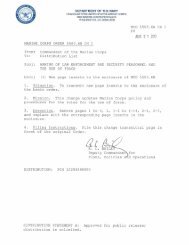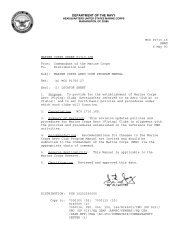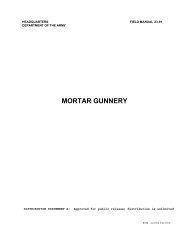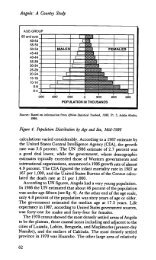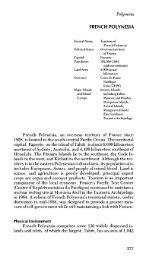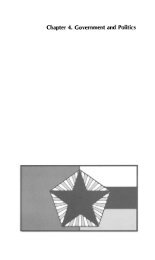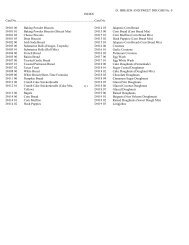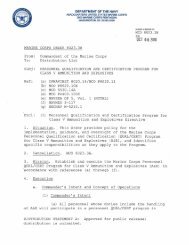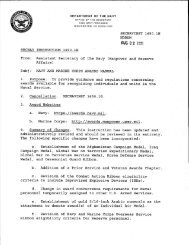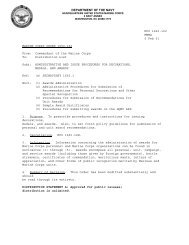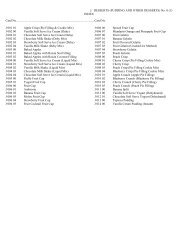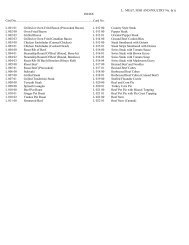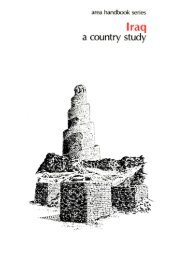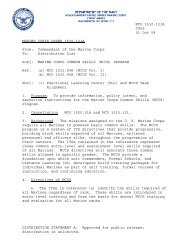MCO 3501.1C W ERRATUM.pdf - Marine Corps
MCO 3501.1C W ERRATUM.pdf - Marine Corps
MCO 3501.1C W ERRATUM.pdf - Marine Corps
Create successful ePaper yourself
Turn your PDF publications into a flip-book with our unique Google optimized e-Paper software.
<strong>MCO</strong> <strong>3501.1C</strong><br />
30 MAR 93<br />
(1) Evaluator Quality. To properly accomplish these important roles, individuals selected as evaluators must have<br />
credibility and be thoroughly prepared to evaluate performance standards. All echelons of the MCCRES exercise<br />
structure must make every effort to assign only the most qualified <strong>Marine</strong>s available to be evaluators for MCCRES<br />
exercises. After identification and selection of the most qualified <strong>Marine</strong>s available, a training program<br />
(evaluator school) must be provided to ensure a complete understanding of evaluator functions.<br />
(2) Evaluator School. Participants at evaluators’ school will include all evaluators, the ED’s representative, the<br />
TEC or appropriate representative, key TECG staff members, officer in charge of the aggressor force, and<br />
representatives from all subelements participating in the evaluation and/or the tactical exercise. Listed below are<br />
those key items which should be covered:<br />
(a) Brief/verification of exercise support requirements as stated in the ED’s LOI.<br />
(b) Specific assignment of evaluators to units/subelements as required.<br />
(c) Detailed brief of exercise scenario to include all major TECG driven events.<br />
(d) Detailed brief of planned aggressor force actions.<br />
(e) Detailed brief of MPS’s to be evaluated and how they relate to the exercise scenario, TECG (higher<br />
headquarters input), and aggressor actions.<br />
(f) Specific evaluator responsibilities with regard to subparagraph 7b(5) above.<br />
(g) EC, TEC, and senior evaluator instructions/ guidance as required.<br />
(h) Brief on the three roles that all evaluators must fill.<br />
(i) Administrative instructions pertaining to the conclusion of the tactical exercise and the constructive<br />
requirements of the exercise debrief/critique.<br />
(3) Evaluator Actions During Exercises. During an exercise, evaluators determine what operational functions are<br />
taking place, choose the appropriate MPS’s applicable to those functions, and record decisions based on the quality<br />
of performance observed in relation to the performance criteria of the standard being MCCRESed. Evaluators record<br />
their notes on the data worksheets, necessary, to support the exercise. Evaluators continue this process throughout<br />
the exercise. At the conclusion of the exercise, evaluators review their data and supporting notes to ensure they<br />
are a true reflection of the performance they have observed.<br />
(4) Senior Evaluator. The senior evaluator coordinates and supervises all evaluators’ activity during the exercise<br />
and debrief, and must be aware of the overall effectiveness of the evaluation, to include TECG effectiveness and the<br />
unit’s performance in the exercise. The senior evaluator compiles the data sheets from all evaluators at the end of<br />
the exercise and conducts the post exercise debrief. Due to the fact that tactical scenarios are used at different<br />
levels of a unit’s organization at different phases of an exercise, some MPS’s tasks and/or standards are scored<br />
more than once. In these instances, evaluators will refer to "the 90 percent rule". This rule allows the evaluator<br />
to score a yes, when based on their observation the unit/element attempted and successfully met the standard’s<br />
criteria, at least, 90 percent of the time. When the "90 percent rule" is used, the senior evaluator must ensure<br />
that the scores of the tasks/standards provides an accurate and fair reflection of the unit’s overall training<br />
level. The senior evaluator identifies trends, strengths, and weaknesses of the unit’s performance and provides<br />
this information with the exercise worksheets to the TEC. Based on a review/analysis of information/data provided<br />
by the senior evaluator, the TEC provides the MCCRES report to the ED and unit commander per instructions contained<br />
in enclosure (5).<br />
8. EXERCISE DEBRIEF. The most important segment of the MCCRES system is the exercise debrief and the quality of<br />
training feedback that is provided to the unit commander. It must be used as a constructive training tool. How the<br />
ED organizes and conducts the required debrief may vary by type unit (air/ground) or type commands (division/FSSG).<br />
The debrief may be conducted in conjunction with the senior evaluator’s debrief or the ED may choose to conduct it<br />
as a subsequent event. Notwithstanding the organization and the timing of the exercise debrief, the following<br />
should be included in all exercise debriefs:<br />
a. Participation/attendance of the following personnel:<br />
(1) ED or appropriate representative.<br />
(2) TEC and key TECG staff members as required.<br />
3<br />
ENCLOSURE (3)



